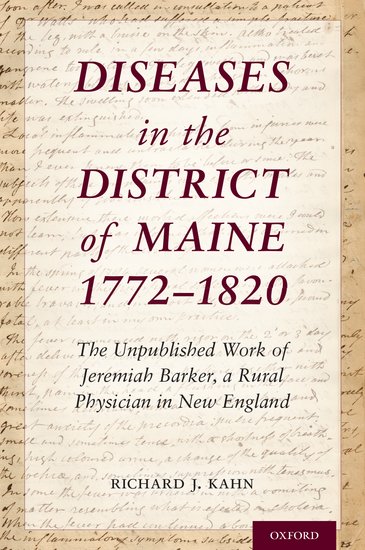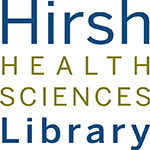Diseases in the District of Maine 1772 to 1820

https://global.oup.com/academic/product/diseases-in-the-district-of-maine-1772—1820-9780190053253?cc=us&lang=en&
A recent and notable addition to our collection is this book of medical history, written and gifted to the library by Dr. Richard J. Kahn, graduate of Tufts Medical School, m1966. Dr. Kahn has also been professor to Tufts students for most of 50 years, now through the Tufts/Maine Medical program. Below he provides a summary of the book and its contents:
“This is the story of a lost manuscript, an unpublished book written 200 years ago by a rural New England physician, who lived and practiced in Gorham and Portland, ME. It will be an important new primary source for medical history, research, and teaching for scholars and will also be of interest to general readers for, as Barker wrote on title page, it was ‘Written so as to be intelligible to those who are destitute of Medical Science.’ My introductory chapters have kept Barker’s goal, to be accessible to the general reader, in mind.
The Jeremiah Barker Papers consist of two manuscript boxes containing letters, casebooks, and several texts with marginalia by Barker, in addition to his unpublished manuscript. It is a fifty-year record of his reflections on diseases, epidemics, diagnoses, treatments, and outcomes, with an unusual effort to consult and cite the medical literature and other physicians in a changing medical landscape, as practice and authority shifted from historical to scientific methods. In short, it is a remarkable record of medicine as practiced in northern New England over 200 years ago, during the shift of medical authority from Hippocrates and Galen to the beginnings of the scientific method.
The publication of Barker’s manuscript, fully annotated, includes my five-chapter introduction, that is a sketch of Barker’s background, education, and writings, the difficulty in obtaining the medical literature through books, journals, newspapers, and the post, and a chapter contextualizing the changing medical climate as science supplanted the words of Hippocrates and Galen. One chapter examines Barker as a ‘dangerous innovator’ experimenting with the new chemistry of Lavoisier. The final chapter suggests ways for the general reader to approach a 200-year-old manuscript, avoiding ‘presentism,’ the post hoc fallacy, and confirmation bias. A glossary will define and explain terms and medications not commonly used in the 21st century.”
You can find Diseases in the District of Maine 1772 to 1820 on the 4th floor of the library at the New Books display.
Recent Posts
Categories
- 4th Floor Tabling (3)
- affiliation (4)
- Announcements (353)
- Book/Resource Reviews (117)
- Hours (131)
- Interviews (4)
- New Titles & Resources (114)
- News & Events (266)
- Open Workshops (48)
- Outside News & Events (66)
- resources (18)
- throwback thursday (5)
- Tips & Tricks (135)
- Uncategorized (148)
Tags
4th floor affiliation books Boston circulation crafts electronic resource electronic resources events exams extended hours food fun fun lab funlab graduation HHSL Hirsh Health Sciences Library holiday holiday hours holidays hours leisure reading library fun lab library service desk library staff new books open access open access week open workshop Open Workshops reserves resources staff statistics summer survey tea Thanksgiving therapy dogs Tufts Hirsh Health Sciences Library website welcome! writing consultants writing helpFollow us @TuftsHHSL!
Twitter feed is not available at the moment.





